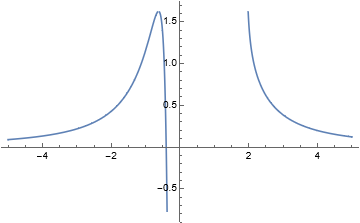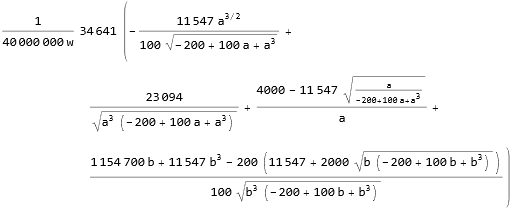Integrate[((3.4641 (0.866025 +
r (-0.288675 + Sqrt[1 - 2/r + 0.01 r^2])))/(r^3 Sqrt[
1 - 2/r + 0.01 r^2] \[Omega])),{r,a,b}]
This is not giving the answer. Can anyone please explain why?
Just a quick observation. Your integrand is not defined over some range, as can be seen by this plot
integrand = ((3.4641 (0.866025 +
r (-0.288675 + Sqrt[1 - 2/r + 0.01 r^2])))/(r^3 Sqrt[
1 - 2/r + 0.01 r^2] w)) // Rationalize

Plot[integrand /. w -> 1, {r, -5, 5}]

So to help Mathematica, tell it where the a and b are to avoid the problem area. Mathematica can do the indefinite integral OK
anti = Integrate[integrand, r]

Which gives one the clue the problem is with the limits given.
anti = Integrate[integrand, {r, a, b}, Assumptions -> {a > 2, b > a},
GenerateConditions -> False]

Compare to numerical:
anti /. {w -> 1, a -> 3, b -> 5} // N
(* 0.429391*)
And
NIntegrate[integrand /. w -> 1, {r, 3, 5}]
(* 0.429391 *)
integrand = ((3.4641 (0.866025 +
r (-0.288675 + Sqrt[1 - 2/r + 0.01 r^2])))/(r^3 Sqrt[
1 - 2/r + 0.01 r^2] ω)) // Rationalize // Simplify;
(integral = Assuming[b > a,
Integrate[integrand, {r, a, b},
GenerateConditions -> True] //
Simplify]) // InputForm
(* ConditionalExpression[
(34641*((400000 - 11547*
Sqrt[100 - 200/a + a^2])*b +
a*(-400000 + 11547*Sqrt[100 - 200/b +
b^2])))/(4000000000*
a*b*ω), b < 0 ||
a > Root[-200 + 100*#1 + #1^3 & , 1, 0]] *)
The conditions are
integral[[-1]] /. x_Root :> N[x]
(* b < 0 || a > 1.9283 *)
NIntegrateso far? $\endgroup$